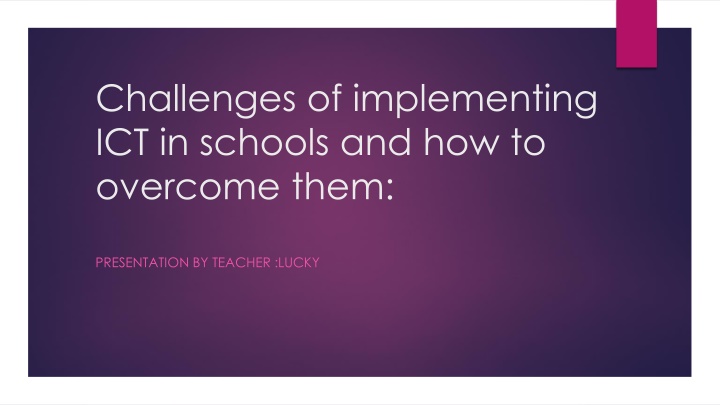
Overcoming Challenges of Implementing ICT in Schools
Learn about the hurdles faced in implementing ICT in schools, including lack of computers, electricity, maintenance issues, and more. Discover strategies to overcome these challenges and enhance technology integration in education.
Uploaded on | 7 Views
Download Presentation

Please find below an Image/Link to download the presentation.
The content on the website is provided AS IS for your information and personal use only. It may not be sold, licensed, or shared on other websites without obtaining consent from the author. If you encounter any issues during the download, it is possible that the publisher has removed the file from their server.
You are allowed to download the files provided on this website for personal or commercial use, subject to the condition that they are used lawfully. All files are the property of their respective owners.
The content on the website is provided AS IS for your information and personal use only. It may not be sold, licensed, or shared on other websites without obtaining consent from the author.
E N D
Presentation Transcript
Challenges of implementing ICT in schools and how to overcome them: PRESENTATION BY TEACHER :LUCKY
ICT IN FULL ICT IN FULL:MEANS information communication and technology.
The followings are the challenges of implementing ict in schools . Lack of computers; Computers are still very expensive and despite spirited efforts by the government agencies, NGO, corporate organizations and individuals to donate computers to as many schools as possible, there still remains a big percentage of the schools unable to purchase computers for use by their students. Lack of electricity; Many schools are still not yet connected to electricity; Uganda being a developing country, the government has not been able to connect all parts of the country to the national electricity grid. Consequently those schools that fall under such areas are left handicapped and may not be able to offer computer studies. Broken down computers; while a good number of schools have benefited from donated used computers, they have not been adequately equipped with the same on maintenance and repair, hence its very common to see a school s computer lab full of broken down computers, some repairable and some not.
Obsolete computers lower the morale of both the teacher and the student; it is very common to find some schools using very old computers running on win98 or win 2000! As you know, technology keeps on evolving and advancing at a high rate, new programs are made every time. For example, most of the Ugandan the schools are still using Microsoft Office 2003 suite, yet the current version of the program is Office 2013, i.e. we are 10 years behind the rest of the world! Burglary; the fact that computers are still very expensive, makes them a target for thieves who usually have ready markets to another party at a much less figure. This has made many schools to incur extra expenses trying to burglar proof the computer rooms. This extra expense makes some schools shy away from purchasing computers for their students. Computer components and hardware parts have also been commonly removed by unfaithful school computer lab attendants who sell them in the back market!
Lack of internet or slow connectivity; most schools are not able to connect to the World Wide Web, due to the high costs involved in the connectivity and this can be overcome by having good internet and high connectivity in schools. Increased moral degradation addiction to social networks such as Facebook, internet pornography, cyber bullying and other anti-social behaviors is a worrying emerging problem therefore the school authorities have to put law against moral degradation. it can play a significant role in equalizing opportunities for marginalized groups and communities. But the paradox is that for those groups that are unable to cross the technology divide, ICT is yet another means to further marginalize them. Education has a major role to play in resolving this problem. Thus, unless ICT becomes part of both the delivery and content of education, the disadvantage will deepen and development will suffer.
